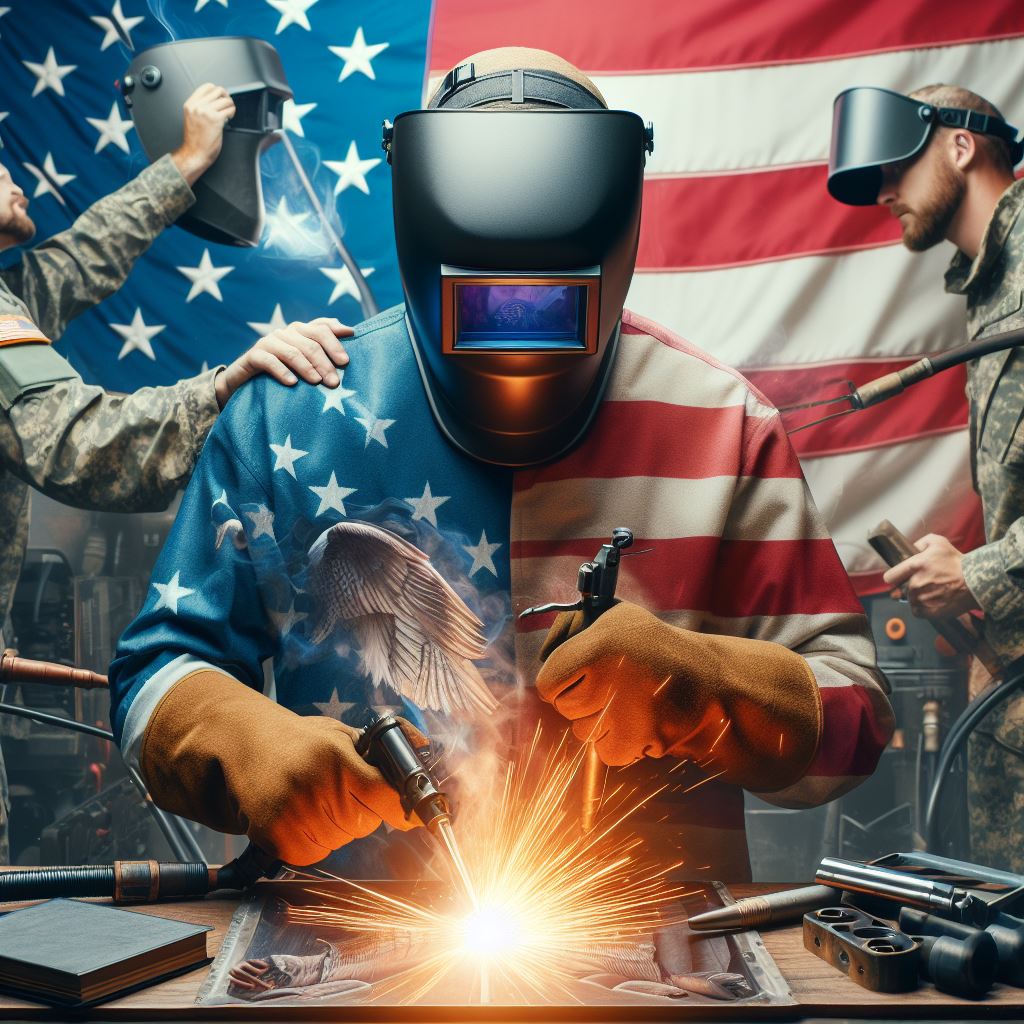Introduction
Veterans bring unparalleled discipline and adaptability to welding careers, enhancing productivity and fostering a robust work environment.
Their proficiency with precision equipment aligns seamlessly with the demands of welding, ensuring quality craftsmanship in every project.
Transitioning veterans often find welding a fulfilling career, providing a sense of purpose and camaraderie reminiscent of their military service.
Employers recognize the value of veteran hires, appreciating their dedication, teamwork, and ability to thrive in high-pressure situations.
Training programs tailored for veterans facilitate their entry into the welding profession, addressing specific needs and ensuring a smooth integration.
The welding industry actively supports veterans, offering specialized programs, mentorship, and resources to ease their career transition.
By embracing veterans into welding careers, the industry not only addresses workforce needs but also honors their sacrifice and service.
Most importantly, the symbiotic relationship between veterans and the welding field creates a win-win scenario, bolstering the workforce and empowering those who served.
Challenges faced by veterans transitioning into welding careers
Lack of industry-specific knowledge and skills
- Veterans often lack the specific knowledge and skills required for a career in welding.
- They may have acquired welding experiences during their service, but it may not be enough.
- Additional training and certifications are often necessary, which can be time-consuming and expensive.
- Without proper training, veterans may struggle to meet the demands of the welding industry.
- Understanding the latest techniques, equipment, and safety protocols are crucial for success in welding.
- However, veterans may find it challenging to adapt and catch up with the rapidly evolving industry.
Difficulties in adjusting to the civilian work environment
- Veterans transitioning into welding careers may face difficulties adjusting to the civilian work environment.
- In the military, they had a clear chain of command, structured schedules, and defined roles.
- However, the civilian workplace, especially in welding, is often less structured and more independent.
- Veterans may struggle with the freedom in decision-making and managing their time and responsibilities.
- They might find it hard to adapt to the less hierarchical structure and lack of strict discipline.
Transitioning from a structured military culture to a more flexible civilian culture
- The transition from the structured military culture to the more flexible civilian culture can be challenging.
- Veterans are used to following strict rules, protocols, and procedures.
- However, the civilian culture, including the welding industry, is often more flexible and adaptable.
- Veterans may struggle with the ambiguity, uncertainty, and lack of clear direction they now face.
- They may find it hard to adjust their mindset from a military mentality to a civilian mindset.
- Building relationships, networking, and self-promotion might also be unfamiliar to veterans.
In essence, veterans transitioning into welding careers face various challenges that hinder their successful integration into the industry.
The lack of industry-specific knowledge and skills, difficulties in adjusting to the civilian work environment, and transitioning from a structured military culture to a more flexible civilian culture are some of the major obstacles they encounter.
Overcoming these challenges requires additional training, adapting to new work environments, and adjusting their mindset to align with the civilian culture.
It is essential to acknowledge and address these challenges to ensure a smooth and successful transition for veterans pursuing welding careers.
Resources available for veterans interested in welding careers
Government initiatives and programs
- GI Bill: Provides financial assistance for education and training programs, including welding.
- Vocational Rehabilitation and Employment (VR&E) Program: Offers job training and placement services for veterans.
- American Jobs Center: Connects veterans with employment opportunities and provides job search assistance.
- Work Opportunity Tax Credit (WOTC): Offers tax incentives to employers hiring veterans, including those in welding careers.
Non-profit organizations assisting veterans in job placements
- Helmets to Hardhats: Helps veterans find careers in the construction industry, including welding.
- Veterans Welding Training: Provides free welding training programs for veterans.
- Welding Warriors: Offers job placement and support for veterans pursuing welding careers.
- Operation: Job Ready Veterans: Assists veterans in transitioning to civilian careers, including welding.
Vocational training and certification programs specifically designed for veterans
- United Association Veterans in Piping Program (UA VIP): Offers free welding training and apprenticeship programs for veterans.
- Welding for Heroes: Provides welding training and certification opportunities for injured veterans.
- Veterans Welding Inc.: Offers comprehensive welding training programs for veterans.
- Heroes MAKE America: Provides advanced manufacturing and welding training programs for transitioning veterans.
Transitioning into a welding career is streamlined for veterans with ample resources.
Government initiatives, including the GI Bill and VR&E Program, furnish financial aid and training.
The American Jobs Center facilitates job searches and connections to welding opportunities. Employers hiring veterans can benefit from the Work Opportunity Tax Credit.
Non-profits like Helmets to Hardhats and Welding Warriors aid in job placement. Veterans Welding Training and Welding for Heroes offer specialized training programs.
Operation: Job Ready Veterans and Heroes MAKE America support veterans’ transition into civilian welding careers.
UA VIP, Veterans Welding Inc., and Heroes MAKE America provide tailored training and certification. With these resources, veterans can smoothly transition into fulfilling welding careers.
Read: Diverse Welding Opportunities: From Oil Rigs to Art Installations
Success stories of veterans who have transitioned into welding careers
Case studies highlighting veterans’ successful transition
- John, a Navy veteran, found a fulfilling career in welding after leaving the military.
- Sarah, an Army veteran, successfully transitioned into welding and is now a certified welder.
- Mark, a Marine Corps veteran, discovered his passion for welding and now runs his own welding business.
Testimonials from veterans about the benefits and opportunities in the welding industry
- “Transitioning into welding was the best decision I made after my military service. It offers stability and growth.” – David, Air Force veteran.
- “The welding industry provides great job prospects and the chance to work with your hands, which is perfect for veterans.” – Amanda, Army veteran.
- “I found a sense of camaraderie and purpose in welding that reminds me of my time in the military.” – Jason, Marine Corps veteran.
Examples of companies or organizations with successful veteran recruitment programs
- Welding Inc. actively recruits veterans and provides specialized training programs to help them transition into welding careers.
- The American Welding Society partners with various companies to create veteran-friendly apprentice programs in the welding industry.
- United Technologies Corporation (UTC) has a strong commitment to hiring veterans and offers competitive benefits and advancement opportunities.
Success stories and testimonials reveal veterans’ smooth transition into the welding industry. Diverse military backgrounds lead to fulfillment, stability, and success.
Transform Your Career Today
Unlock a personalized career strategy that drives real results. Get tailored advice and a roadmap designed just for you.
Start NowNavy veteran John found welding a perfect fit, excelling due to discipline and attention to detail. He now mentors fellow veterans.
Army veteran Sarah, through vocational training, discovered her passion for welding. She thrives in a construction company, enjoying stability and accomplishment.
Veterans benefit from welding’s stability and growth potential, according to Air Force veteran David. Amanda, an Army veteran, appreciates the hands-on nature.
Marine Corps veteran Jason finds camaraderie in the welding industry. Supportive communities help veterans integrate successfully.
Companies like Welding Inc., the American Welding Society, and United Technologies Corporation (UTC) bridge the gap for veterans, offering training and competitive benefits.
In general, veterans entering the welding industry experience smooth transitions, find stable and fulfilling careers, and enjoy support from both peers and companies.
Read: Crisis Response: Plumbers in US Natural Disasters and Emergencies

Support networks and mentorship programs for veterans in the welding industry
Importance of networking and mentorship in the transition process
Transitioning from military service to a civilian career can be challenging for veterans, particularly in finding stable employment.
Fortunately, support networks and mentorship programs play a crucial role in aiding veterans’ transition into the welding industry.
Networking and mentorship provide veterans with valuable guidance, professional connections, and a supportive community, assisting them in navigating the complexities of entering a new field.
Overview of existing support networks and organizations
Various organizations and support networks have been established to assist veterans in their welding career transition.
One notable organization is Veterans in Welding (VIW), which connects transitioning veterans with employers and provides them with training opportunities.
VIW also organizes networking events and workshops to help veterans build relationships and gain industry insights.
Another organization making an impact is Helmets to Hardhats (H2H), which focuses on connecting military service members with apprenticeship opportunities in the construction trades, including welding.
H2H connects veterans with employers and provides personalized support throughout the entire process.
Furthermore, the American Welding Society (AWS) offers resources and support networks exclusively for veterans, such as membership benefits, scholarships, and access to industry-specific training and certifications.
AWS also hosts networking events and conferences tailored to veterans’ needs.
Benefits and outcomes of joining support networks and mentorship programs
Participating in support networks and mentorship programs can yield numerous benefits and positive outcomes for veterans transitioning into welding careers.
- Access to industry-specific knowledge: Support networks and mentors provide valuable industry insights, helping veterans bridge the knowledge gap between military service and the welding industry.
- Enhanced job opportunities: Through networking, veterans can learn about job openings, apprenticeships, and training programs specific to the welding industry. These connections often lead to increased employment prospects.
- Professional growth and development: Mentors offer guidance on career advancement, skill development, and welding certifications. They provide advice on resumes, interviews, and assist in identifying suitable job opportunities.
- Emotional and social support: Support networks create a sense of community where veterans can share experiences, challenges,and successes with like-minded individuals who understand their unique journey.
- Building confidence and resilience: Mentors can help veterans navigate potential obstacles, boost their self-confidence, and foster resilience during the transition process.
Overall, support networks and mentorship programs are vital resources that enable veterans to successfully transition into welding careers.
These initiatives provide much-needed support, guidance, and networking opportunities, ultimately leading to increased employment and success in the welding industry.
Transform Your Career Today
Unlock a personalized career strategy that drives real results. Get tailored advice and a roadmap designed just for you.
Start NowRead: The Role of Unions in Shaping the Welder Profession in USA
Tips and Advice for Veterans Transitioning into Welding Careers
A successful transition from military service to a welding career requires careful planning and preparation.
Here are some tips and advice to help veterans make a seamless transition:
Research and Understand the Welding Industry
- Learn about the various types of welding and determine which area interests you the most.
- Research the job market, including salary ranges and demand for welders in your area.
- Understand the qualifications and certifications needed to pursue a career in welding.
Utilize Available Resources such as Government Programs and Organizations
- Explore government programs that offer training and financial assistance for veterans.
- Visit the U.S. Department of Veterans Affairs website to learn about benefits and programs available for veterans transitioning into new careers.
- Connect with organizations like Veterans in Welding, which provide support and resources specifically for veterans entering the welding industry.
Seek Mentorship and Networking Opportunities
- Find a mentor who is an experienced welder and can provide guidance throughout your career transition.
- Join professional associations and attend industry events to network with seasoned welders and potential employers.
- Consider reaching out to fellow veterans who have successfully transitioned into welding careers for advice and support.
Emphasize Transferable Skills and Experiences from Military Service
- Highlight your discipline, work ethic, and leadership abilities when applying for welding positions.
- Showcase how your military training has prepared you to work under pressure and in challenging environments.
- Emphasize any technical skills or experiences gained during your military service that translate to the welding industry.
In fact, transitioning into a welding career as a veteran requires thorough research, utilization of available resources, seeking mentorship and networking opportunities, and emphasizing transferable skills.
By following these tips, veterans can successfully navigate the process and find fulfilling careers in the welding industry.
Read: How to Become a Certified Welder in the United States
Conclusion
Recap of the importance of veterans transitioning into welding careers
Transitioning into welding careers not only benefits veterans by providing them with stable and fulfilling employment, but it also addresses the shortage of skilled welders in the United States.
Final thoughts and encouragement for veterans considering this career path
For veterans seeking a new purpose and a chance to utilize their skills and dedication, welding can be an excellent career choice.
The welding industry offers numerous opportunities for growth, both personally and professionally.
Call to action to support and advocate for veterans in the welding industry
It is essential for society to recognize the value veterans bring to the welding industry.
Support programs, vocational training, and advocacy efforts can help veterans in their transition and ensure they receive the recognition and support they deserve.
Veterans transitioning into welding careers in the United States not only benefits the individuals themselves but also addresses the shortage of skilled welders.
By supporting and advocating for veterans in the welding industry, we can create a pathway to success and fulfillment for these deserving individuals.
[E-Books for Sale]
The Big Book of 500 High-Paying Jobs in America: Unlock Your Earning Potential
$19.99 • 500 High-Paying Jobs • 330 pages
Explore 500 high-paying jobs in America and learn how to boost your career, earn more, and achieve success!
See All 500 High-Paying Jobs of this E-Book
1001 Professions Without a Degree: High-Paying American Jobs You Can Start Now
$19.99 • 1001 Professions Without a Degree • 174 pages
Discover 1001 high-paying jobs without a degree! Unlock career tips, skills, and success strategies for just $19.99!




